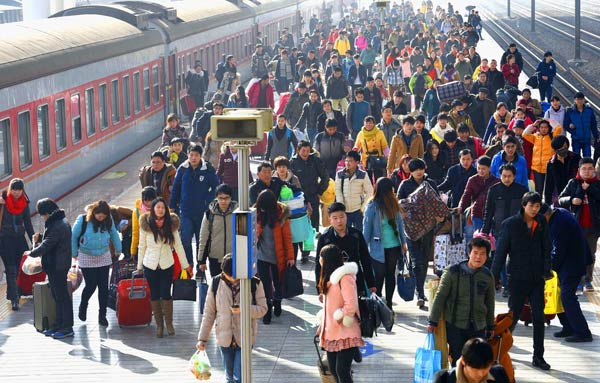continued..
In addition to this, there are three major external challenges. The first is the trade war, which is in fact no longer a trade war but rather a clash between two opposed value systems. It can be said with certainty that the Sino-U.S. relationship has come to a crossroads right now and faces significant historic challenges. What are we to do? To be honest, I don’t think we have really found much of a solution.
You are aware that Huawei’s CFO Meng Wanzhou was recently detained in Vancouver. In the past two days, mainstream media such as BBC and CNN have been reporting on how the U.S. is going at Huawei on all fronts. What this tells us is that this issue is not simply about trade or economics.
We used to speak of “China’s period of strategic opportunity for economic growth.” Does this period of strategic opportunity still exist? Personally, looking at the international situation, I think this period of strategic opportunity is fading quick.
Let’s think about what “international period of strategic opportunity” means. It means that in the past, international regulations have been favorable to us; we had open access to technology, capital, talent, and markets. Because of the imminent changes we face on the domestic and international fronts, I have titled today’s speech “the great shift unseen over the last forty years.” (四十年未有之大变局)
Have we really given the problems due consideration? Of course the short-term problem we are looking at is economic decline; the preponderance of data demonstrating this point needs no introduction here. Data concerning performance in November hasn’t been released, but you can extrapolate based on the October figures: there’s been a decline across virtually all sectors, from consumption in retail, autos, or real estate. Just look at China’s exports. Who can say that the trade war didn’t impact China and that China is sure to win the war no matter how big it is? Why don’t the people who were saying this kind of thing in April and May stand by their words now?
Why did we made such mistakes in assessing the international circumstances?
Look at these numbers. That China faces a long-term economic downturn is not a problem by itself. But you may have noticed that the consumption and the service sectors now make up 78.5 percent of GDP. Going by the government’s logic, this should be a good thing, since it means the economic transition to a consumption economy has been successful: we used to rely on investment and export, now we rely on consumption and the service sector. This sounds reasonable, but think about it: in a country like China, as investment slows dramatically, how can we maintain economic stability by solely relying on consumption?
The fact that consumption and services comprise 78.5 percent of GDP may be good news to some extent, but is far eclipsed by the negative implications. Take a look at investment. More importantly, can consumption alone support faster economic growth?
In the four decades following the economic reform, we have undergone five phases of consumption. The first was to solve the food problem, the second was the “New Big Three” [新三大件, short for refrigerator, color TV, and washing machine], the third was the consumption of information, the fourth was automobiles, and fifth was real estate.
But these five waves have essentially all come to an end. Car sales have dropped sharply and real estate spending is also substantially decreasing, so we are facing serious problems. This is the crux of the
called for by the Politburo [stable employment, stable finance, stable foreign trade, stable foreign investment, stable investment and stable expectations], or as some internet users have joked, the six “tender kisses” [吻, kiss, is a homophone for 稳, stability].
Now, let me give you three more “kisses”: stable reserves, stable exchange rates, and stable housing prices.
It should be fairly obvious that these stabilities are difficult to achieve. For now it looks that “stable foreign investment” and “stable foreign exchange rates” shouldn’t be a problem. Foreign investment is basically stable. But how can you stabilize investment, exports, real estate market, and employment? The reason that I want to share the word “reflect” with everyone today is that we need to reflect on why this happened, and on how to find an appropriate solution.
As economy slows, financial risk escalates and shadow banking shrinks rapidly. Some say that the president of China’s central bank has come out to apologize, saying that their prior policy was not well thought out, lacked coordination, and wasn’t properly implemented, that these, coupled with the effects of overbearing regulations, caused credit to recede. This is certainly an important reason, but it’s not the fundamental issue.
We can see that the direct financing market, whether the bonds or stock market, has been cut in half in 2018 and that many companies have defaulted. Total debt due to default has exceeded 100 billion RMB ($14.5 billion) for the first three quarters.
According to data provided by the government, the corporate debt default could exceed 120 billion RMB, and many businesses have gone bankrupt. As Cao Dewang (曹德旺) put it, companies are collapsing in droves; not even state-owned enterprises are spared this phenomenon. Bohai Steel, once listed in the Fortune Global 500, was 192 billion RMB in debt when it bankrupted; the real number could be as high as 280 billion RMB.
Local debt is a big problem in China’s financial market. As for the actual number, the National Audit Office claims it to be about 17.8 trillion RMB, while He Keng (贺铿), vice director of National People’s Congress Financial and Economic Affairs Committee, thinks it’s over 40 trillion RMB. Worse yet, not one local government intends to pay back its debts.
So this is the larger context. Then there’s also the stock market crash. My friend Mr. Jin Yanshi (金岩石) will share with you shortly his thoughts about an impending stock market rebound, but in my opinion, it’s far from forthcoming. You can look at the history: only the Wall Street Crash of 1929 can compare to the steep decline that the Chinese stock has experienced this year. Many stocks are down 80 or even 90 percent.
So here’s a problem that we need to think about today: we know China’s stock market is feeling the pain, but what exactly is hurting?
Some people blame the securities regulators, Chairman Liu (刘主席), or this and that, but I think they are going after the wrong people. The problem lies in regulatory policy, which I fear may be lacking. The absence of comprehensive stock regulation might be an important issue, but it’s not the crucial one.
Look at our profit structure. To put it plainly, China’s listed companies don’t really make money. Then who has taken the few profits made by China’s more than 3,000 listed companies? Two-thirds have been taken by the banking sector and real estate. The profits earned by 1,444 listed companies on the SME board and growth enterprise board are not even equal to one and half times the profit of the Industrial and Commercial Bank of China. How can this kind of stock market become a bull market?
When we buy stocks, we are buying the profits of the company, not hype and rumors. I recently read a report comparing the profits of China’s listed companies with those in the U.S. There are many U.S. public companies with tens of billions dollars in profits. How many Chinese tech and manufacturing companies are there that have accomplished this? There is only one, but it’s not listed, and you all know which one that is. [Xiang is referring to Huawei, the Chinese tech company.] What does this tell us? As Yale professor Robert Shiller said: stock market performance may not work as a barometer of the economy in the short run, but it does for sure in the long run.
So I think that the terrible stock performance only demonstrates one thing, which is that the real economy in China is in quite a mess. Where is the stock market rebound? I think it’s obvious that investor confidence has yet to recover.
A number of policies came out on October 19 and 20, and Vice Premier Liu He (刘鹤) personally gave a speech to pledge results, but what of it now? The SSE Index fell to 2600 points by last Friday, and just stayed there, barely alive. When is the market rebound coming? Real estate is not showing much cause for optimism right now, but I won’t go into details for lack of time. You can take a picture of the data for your reference.
That’s why China wants to fight the three tough battles. China’s economic decline indicates that there is a major issue with the focus on expansion and growth: It has deviated from the fundamental and moved to speculation. These are the words of former chief of China’s central bank, Zhou Xiaochuan (周小川).
What are our current financial risks? They are hidden, complex, acute, contagious, and malevolent. Structural imbalance are massive, and violations of law and regulations are rampant. There are black swans to prevent, and gray rhinos to stop. A reporter once asked Zhou, “Where are the black swans? Which ones?” Zhou smiled and did not answer.
The black swans are right next to you. The
, blockchain, Coin Circle, aren’t all these black swans? But you can’t see them. As for the gray rhinos, they can charge at any time. The biggest of them is real estate.
We have rampant speculations everywhere, in too many aspects. In short, it’s arbitrage.




